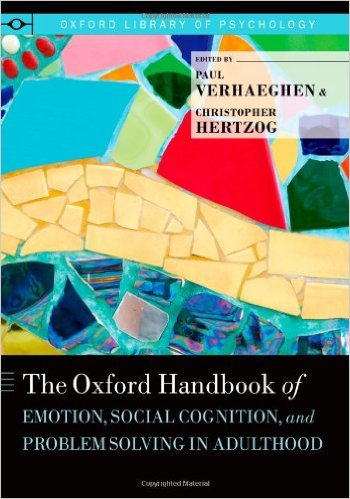 Editors: Paul Verhaeghen, PhD, and Christopher Hertzog, PhD
Editors: Paul Verhaeghen, PhD, and Christopher Hertzog, PhD
Publisher: Oxford University Press – 330 pages
Book Review by: Sonu Chandiram
What roles do thinking and feeling play in the psychological development and maturity of people, particularly adults? In psychology, thinking is referred to (loosely) as “cognition,” and feeling is formally termed “emotion.” How cognition and emotion interplay in everyday problem solving has become a relatively new and important area of research in psychology, especially social psychology where there are interactions between individuals and among people in groups.
The focus of this book is socio-emotional development as it relates to adult development and aging. A lot of new findings in this area of psychology have been brought forth from research studies in recent decades. New theories have also emerged to support these findings and to try make as much sense of them as possible.
The editors and authors of the various chapters of this book point out that current trends in psychological research take into account social, emotional, and motivational influences on thought and action (cognition and behavior).
The editors – Drs. Paul Verhaeghen and Christopher Hertzog – point out this book is on a new field that has emerged, and this field lies at the intersections of the following:
- Coping
- Emotion
- Everyday problem solving
- Social cognition
- Socio-emotional development
Forty-six professors at various universities as well as experts in related fields – such as adult development, cognitive science, communication studies, gerontology, healthy aging, human development, human ecology, psychology, psychological medicine, social research, sociology, and sustainability – in the United States and these eight countries – Australia, Canada, France, Germany, the Netherlands, New Zealand, Scotland, Switzerland – wrote the 20 chapters of this very insightful book.
To give you a broad overview of what is, and what is not covered in this book, we list here the chapters of this book, organized around four Parts:
- Introduction
- Emotion During Childhood
- Older Adults’ Perception of Social and Emotional Cues
- The Effects of Age on Memory for Socio-emotional Material
- Age Changes in Facial Morphology: Emotional Communication, and Age Stereotyping
- Do Everyday Affective Experiences Differ Throughout Childhood?
- Emotion in Context: Antecedents and Consequences
- The Dynamics of Cognitive-Emotional Integration
- Putting Emotional Aging in Context
- Positive Emotions and Health in Adult and Later Life
- Boundary Conditions for Emotional Well-Being in Aging
- Tasks, Capacities, and Tactics
- Reconciling Cognitive Decline and Increased Well-Being
- Everyday Problem Solving
- Contextual Variation in Adults’ Emotional Regulation During Everyday Problem Solving
- Goals and Strategies for Solving Interpersonal Everyday Problems Across the Lifespan
- Goals, Strategies, and Well-Being Across Adulthood
- Social Cognition and Goals
- My Heart Will Go On: Aging and Autonomic Nervous System Responding in Emotion
- Aging Influences on Judgment and Decision Processes
- Wisdom and Emotions
- Values Across Adulthood
- Casual Attributions Across the Lifespan
- Stereotype Threat in Older Adults
The organizational system order for materials in each chapter consists typically of these elements:
- Chapter Number and Title
- Chapter Authors’ Names
- Abstract
- Key Words
- Introduction
- Topics and Subtopics of Discussion
- Conclusion
- Future Directions for Research
- Acknowledgments
- Notes
- References
Among the positives of this book are that the editors and authors:
- Reject a universal deficit model of aging, highlighting instead the dynamic nature of socio-emotional development
- Point out the differentiation in individual trajectories of development as a function of variation in contextual and experiential influences
- Emphasize the need for a cross-level examination (from biology and neuroscience to cognitive and social psychology) of the determinants of emotional and socio-emotional behavior
- Pay a tribute to Fredda Blanchard Fields whose thinking and empirical research contributed extensively to a life-span developmental view of emotion, problem solving and social cognition
Editors:
Paul Verhaeghen, PhD is a Professor of Psychology at Georgia Institute of Psychology. He is interested in working memory, attention, executive control, creativity, aging, and interfaces between them.
Christopher Hertzog, PhD is a Professor of Psychology at Georgia Institute of Technology. He specializes in adult development and aging, with an emphasis on understanding individual differences in cognitive changes in old age and variables that can help predict and explain successful cognitive aging, including health, lifestyle, and adaptive self-regulation.






